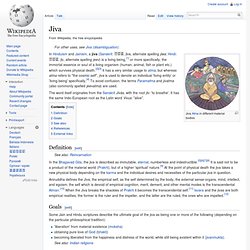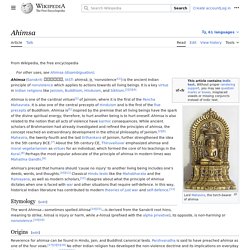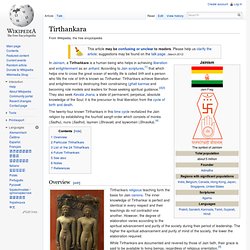

Karma in Jainism. Karma not only encompasses the causality of transmigration, but is also conceived of as an extremely subtle matter, which infiltrates the soul—obscuring its natural, transparent and pure qualities.

Karma is thought of as a kind of pollution, that taints the soul with various colours (leśyā). Based on its karma, a soul undergoes transmigration and reincarnates in various states of existence—like heavens or hells, or as humans or animals. Philosophical overview[edit] According to Jains, all souls are intrinsically pure in their inherent and ideal state, possessing the qualities of infinite knowledge, infinite perception, infinite bliss and infinite energy.[2] However, in contemporary experience, these qualities are found to be defiled and obstructed, on account of the association of these souls with karma. Material theory[edit] Self regulating mechanism[edit] According to Indologist Robert J. Jainism, more than any other creed, gives absolute religious independence and freedom to man. Jiva. The word itself originates from the Sanskrit Jivás, with the root jīv- 'to breathe'.

It has the same Indo-European root as the Latin word Vivus: "alive". Definition[edit] In the Bhagavad Gita, the jiva is described as immutable, eternal, numberless and indestructible.[5][6][7][8] It is said not to be a product of the material world (Prakrti), but of a higher 'spiritual' nature.[9] At the point of physical death the jiva takes a new physical body depending on the karma and the individual desires and necessities of the particular jiva in question. Goals[edit] Some Jain and Hindu scriptures describe the ultimate goal of the jiva as being one or more of the following (depending on the particular philosophical tradition): 'liberation' from material existence (moksha)obtaining pure love of God (bhakti)becoming liberated from the happiness and distress of the world, while still being existent within it (jivanmukta).
See also[edit] References[edit] External links[edit] Ahimsa. Ahimsa (Sanskrit: अहिंसा; IAST: ahimsā, Pāli:[1] avihiṃsā) is a term meaning 'not to injure' and 'compassion'.[2][3] The word is derived from the Sanskrit root hiṃs – to strike; hiṃsā is injury or harm, a-hiṃsā is the opposite of this, i.e. cause no injury, do no harm.[4][5] Ahimsa is also referred to as nonviolence, and it applies to all living beings—including all animals—according to many Indian religions.[6] Ahimsa is one of the cardinal virtues[7] and an important tenet of 3 major religions (Jainism, Hinduism, and Buddhism).

Ahimsa is a multidimensional concept,[8] inspired by the premise that all living beings have the spark of the divine spiritual energy; therefore, to hurt another being is to hurt oneself. Ahimsa has also been related to the notion that any violence has karmic consequences. Etymology[edit] There is a debate on the origins of the word Ahimsa, and how its meaning evolved. Ancient texts use ahimsa to mean non-injury, a broader concept than non-violence. War. Tirthankara. The twenty-four known Tīrthaṅkars in this time cycle revitalized the Jain religion by establishing the fourfold sangh order which consists of monks (Sadhu), nuns (Sadhvi), laymen (Shravak) and laywomen (Shravika).[4] Overview[edit] Rishabhadeva (left) and Mahavira (right) Tīrthaṅkars religious teaching form the basis for Jain canons.

The inner knowledge of Tīrthaṅkar is perfect and identical in every respect and their teachings do not contradict one another. However, the degree of elaboration varies according to the spiritual advancement and purity of the society during their period of leadership. While Tirthankars are documented and revered by those of Jain faith, their grace is said to be available to living beings, regardless of religious orientation.[5] Tirthankars dwell exclusively within the realm of their Soul, and are entirely free of kashays, inner passions, and personal desires. Particular Tīrthaṅkars[edit] The 24 Tirthankars List of the 24 Tīrthaṅkars[edit] Future Tirthankars[edit]